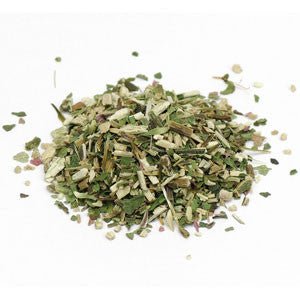Echinacea Purpurea Herb Cut
Echinacea is widely used to fight infections, especially the common cold and other upper respiratory infections. Some people take echinacea at the first sign of a cold, hoping they will be able to keep the cold from developing. Other people take echinacea after cold symptoms have started, hoping they can make symptoms less severe. The people who use echinacea to treat symptoms have the right idea. Research to date shows that echinacea probably modestly reduces cold symptoms, but it’s not clear whether it helps prevent colds from developing.
Echinacea is also used against many other infections including the flu, urinary tract infections, vaginal yeast infections, genital herpes, bloodstream infections (septicemia), gum disease, tonsillitis, streptococcus infections, syphilis, typhoid, malaria, and diphtheria.
Other uses not related to infection include chronic fatigue syndrome (CFS), rheumatism, migraines, acid indigestion, pain, dizziness, rattlesnake bites, and attention deficit-hyperactivity disorder (ADHD).
Sometimes people apply echinacea to their skin to treat boils, abscesses, skin wounds, ulcers, burns, eczema, psoriasis, UV radiation skin damage, herpes simplex, bee stings, and hemorrhoids.
Disclaimer: Please note that Rooted Kitchen is a supplier of natural dried herbs, spices and ingredients. Information on this website is compiled from various sources for educational purposes only and should not be used to treat or diagnose any medical condition. Please consult your doctor or a qualified healthcare professional for additional insight.
Echinacea is widely used to fight infections, especially the common cold and other upper respiratory infections. Some people take echinacea at the first sign of a cold, hoping they will be able to keep the cold from developing. Other people take echinacea after cold symptoms have started, hoping they can make symptoms less severe. The people who use echinacea to treat symptoms have the right idea. Research to date shows that echinacea probably modestly reduces cold symptoms, but it’s not clear whether it helps prevent colds from developing.
Echinacea is also used against many other infections including the flu, urinary tract infections, vaginal yeast infections, genital herpes, bloodstream infections (septicemia), gum disease, tonsillitis, streptococcus infections, syphilis, typhoid, malaria, and diphtheria.
Other uses not related to infection include chronic fatigue syndrome (CFS), rheumatism, migraines, acid indigestion, pain, dizziness, rattlesnake bites, and attention deficit-hyperactivity disorder (ADHD).
Sometimes people apply echinacea to their skin to treat boils, abscesses, skin wounds, ulcers, burns, eczema, psoriasis, UV radiation skin damage, herpes simplex, bee stings, and hemorrhoids.
Disclaimer: Please note that Rooted Kitchen is a supplier of natural dried herbs, spices and ingredients. Information on this website is compiled from various sources for educational purposes only and should not be used to treat or diagnose any medical condition. Please consult your doctor or a qualified healthcare professional for additional insight.
Echinacea is widely used to fight infections, especially the common cold and other upper respiratory infections. Some people take echinacea at the first sign of a cold, hoping they will be able to keep the cold from developing. Other people take echinacea after cold symptoms have started, hoping they can make symptoms less severe. The people who use echinacea to treat symptoms have the right idea. Research to date shows that echinacea probably modestly reduces cold symptoms, but it’s not clear whether it helps prevent colds from developing.
Echinacea is also used against many other infections including the flu, urinary tract infections, vaginal yeast infections, genital herpes, bloodstream infections (septicemia), gum disease, tonsillitis, streptococcus infections, syphilis, typhoid, malaria, and diphtheria.
Other uses not related to infection include chronic fatigue syndrome (CFS), rheumatism, migraines, acid indigestion, pain, dizziness, rattlesnake bites, and attention deficit-hyperactivity disorder (ADHD).
Sometimes people apply echinacea to their skin to treat boils, abscesses, skin wounds, ulcers, burns, eczema, psoriasis, UV radiation skin damage, herpes simplex, bee stings, and hemorrhoids.
Disclaimer: Please note that Rooted Kitchen is a supplier of natural dried herbs, spices and ingredients. Information on this website is compiled from various sources for educational purposes only and should not be used to treat or diagnose any medical condition. Please consult your doctor or a qualified healthcare professional for additional insight.
Please note that Rooted Kitchen is a supplier of natural dried herbs, spices and ingredients. Information on this website is compiled from various sources for educational purposes only and should not be used to treat or diagnose any medical condition. Please consult your doctor or a qualified healthcare professional for additional insight.
